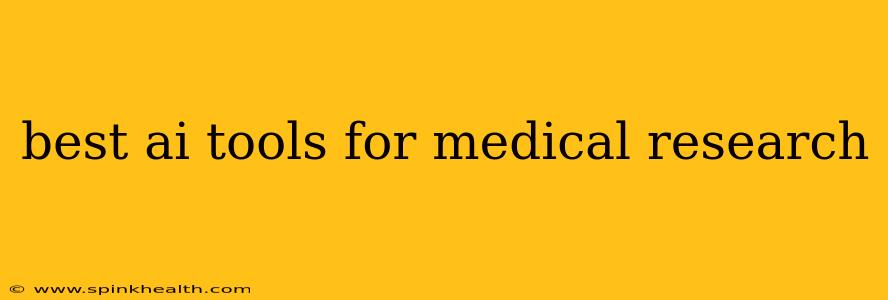The Best AI Tools Revolutionizing Medical Research: A Story of Discovery
The world of medical research is undergoing a dramatic transformation, fueled by the rapid advancements in artificial intelligence. No longer a futuristic fantasy, AI is now a powerful ally in the fight against disease, accelerating discoveries and improving patient care. But with a plethora of AI tools emerging, navigating this landscape can feel overwhelming. This journey will explore some of the best AI tools currently making waves in medical research, revealing their capabilities and illustrating their impact on the future of healthcare.
Our story begins not in a sterile laboratory, but in the heart of a bustling hospital. Imagine a team of researchers grappling with mountains of patient data – genetic sequences, medical images, clinical notes – a seemingly insurmountable task. This is where AI steps in, offering a helping hand, or rather, a powerful algorithm.
What are the different types of AI used in medical research?
This is a crucial question, as understanding the diverse applications of AI is key to appreciating its transformative power. AI in medical research isn't a monolithic entity; it encompasses several techniques, each with its own strengths and applications. We're talking about:
-
Machine Learning (ML): This is the workhorse of many AI applications. ML algorithms learn from data, identifying patterns and making predictions without explicit programming. In medical research, this might involve predicting disease risk based on patient demographics and genetic information or identifying cancerous cells in microscopic images.
-
Deep Learning (DL): A subset of ML, deep learning uses artificial neural networks with multiple layers to analyze complex data. It excels at tasks like image analysis (detecting anomalies in medical scans) and natural language processing (extracting insights from medical literature).
-
Natural Language Processing (NLP): This allows computers to understand and process human language. In medical research, NLP is invaluable for analyzing vast amounts of unstructured data, such as research papers, clinical notes, and patient feedback, extracting key information and identifying trends.
-
Computer Vision: This field enables computers to "see" and interpret images. It's revolutionizing medical imaging, allowing for faster and more accurate diagnosis of diseases like cancer, heart conditions, and neurological disorders.
What are some examples of AI tools used in medical research?
Let's delve into some specific examples, showcasing the practical applications of these AI techniques. Imagine our research team now equipped with these powerful tools:
-
AI-powered image analysis platforms: These tools analyze medical images (X-rays, CT scans, MRIs) to detect anomalies, assisting radiologists in making quicker and more accurate diagnoses. They can highlight suspicious areas, quantify the size and extent of lesions, and even predict the likelihood of disease progression.
-
Drug discovery and development platforms: AI accelerates the drug discovery process by analyzing vast datasets of molecular structures and biological pathways, predicting the effectiveness of potential drug candidates and significantly reducing the time and cost associated with bringing new treatments to market.
-
Genomic analysis platforms: These tools analyze genomic data to identify genetic variations associated with diseases, paving the way for personalized medicine. They can predict individual responses to different treatments, allowing for more targeted and effective therapies.
-
Clinical trial design and management platforms: AI can optimize the design and execution of clinical trials, improving efficiency and reducing costs. It can help identify suitable participants, predict trial outcomes, and even automate data collection and analysis.
How accurate are AI tools in medical research?
Accuracy is paramount in medical research, and AI tools are constantly being refined to improve their reliability. While AI isn't perfect and requires careful validation, its accuracy is rapidly increasing, surpassing human performance in certain tasks. The key lies in rigorous testing, validation using large and diverse datasets, and ongoing refinement of algorithms. The accuracy also depends heavily on the quality and quantity of data used to train the AI model. Garbage in, garbage out, as the saying goes.
What are the ethical considerations of using AI in medical research?
The ethical implications of AI in medicine cannot be overlooked. Issues such as data privacy, bias in algorithms, and the potential for job displacement require careful consideration. Ensuring fairness, transparency, and accountability in the development and deployment of AI tools is crucial to building public trust and maximizing the benefits while mitigating the risks. Robust regulatory frameworks and ethical guidelines are essential to navigate these challenges responsibly.
What are the future trends in AI for medical research?
The future of AI in medical research is bright, with exciting advancements on the horizon. We can anticipate even more sophisticated AI tools capable of integrating diverse data sources, providing more accurate predictions, and enabling more personalized and effective treatments. The integration of AI with other technologies, such as the Internet of Things (IoT) and blockchain, will further enhance its capabilities, leading to a revolution in healthcare. The convergence of these technologies will create a more connected, efficient, and patient-centric healthcare system.
In conclusion, AI is not replacing human researchers; it's empowering them with powerful tools to accelerate discoveries and improve the lives of patients. The journey towards a healthier future is ongoing, and AI is a vital compass guiding us forward. This narrative is just the beginning of a fascinating story – a story of collaboration between humans and machines, where innovation and compassion unite to overcome the greatest challenges in healthcare.

